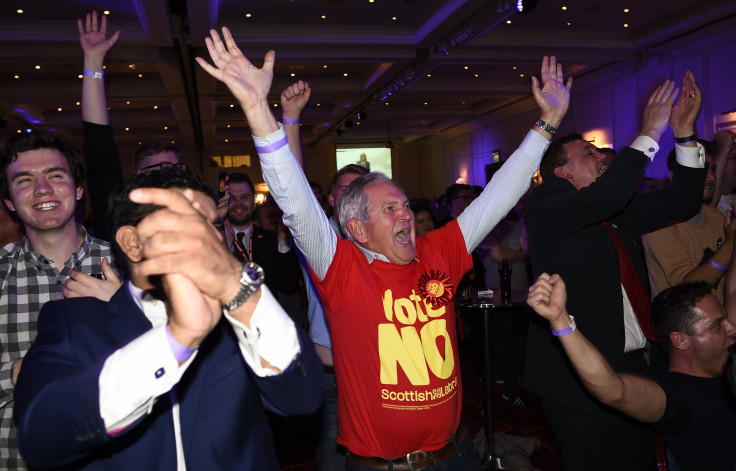How The Pro-Unionists Pulled Out A Victory In Scotland With Hard Numbers And Concessions

The United Kingdom woke up Friday no less united than it was Thursday as a landmark independence referendum showed 55 percent of Scots favored staying within Great Britain. The pro-independence Yes camp made a strong push in the last months leading up to the referendum that had many Brits worried they would lose Scotland, but voters made it clear: Independence was just too risky for a majority of Scots.
The No campaign succeeded by continuously hammering on the Yes campaign’s failure to answer key questions about an independent Scotland: What currency will it use? What will its military look like? How much North Sea oil will it get?
Currency Confusion
The currency issue proved to be the most significant hurdle for anti-union activists. Some 57 percent of No voters told a poll by Lord Ashcroft that one of the most important reasons they voted No was to keep the pound sterling. Polls showed a majority of English and Welsh voters did not want the U.K. to allow Scotland into a currency union, and the British government was emphatic that it would not allow Scotland to use the pound sterling. Independence leader Alex Salmond was adamant that Scotland could use the pound, but conceded that if it did, it would have virtually no control over lending prices or its administration.
Ipsos MORI polled around 1,000 Scottish voters and found that 58 percent of No supporters resisted independence out of fear for the future, whereas Yes voters voted so out of hope.
What's driving voters in #indyref? 80% of Yes say hope for future if they win, 58% of No say fear for future if lose pic.twitter.com/qUXWUw3aM6
- Bobby Duffy (@BobbyIpsosMORI) September 18, 2014More Powers For Scottish Parliament
The pro-unionists conceded what Scots wanted all along, and now Scots will get it: more power relegated from Westminster and given to the Scottish parliament. When Alex Salmond and David Cameron negotiated the terms of the referendum in 2012, Salmond wanted an option for more relegated powers to Scotland, commonly called devo max, but Cameron wanted it to be a simple Yes or No vote.
Scots have shown time and time again they wanted more powers for the Scottish parliament within the U.K. system. Polls as recent as February revealed that a majority of Scots would have voted for devo max if it were on the ballot. More than half of Scots said they were worried about Scotland’s independent future, while only 28 percent said they were worried about Scotland’s future under devo max.
It wasn’t until the day of the first debate between Salmond and Darling in early August that the powers that be in Westminster signed a pledge of more devolved powers in the case of a No vote, in a bid to undermine Salmond's campaign. They reiterated that pledge in the days leading up to the election when it became clear the referendum would be a close fight.
After resigning as first minister Friday hours after the election results were made public, Salmond said many Scots were likely swayed by the promises of Westminster. He also accused Cameron and his allies for rescinding on some of those promises and urged Scots to “hold their feet to the fire.”
Voter Turnout
The No camp also got more voters out on referendum day. Only one of the 10 councils with the highest turnout voted for independence, and that council made up only 2 percent of the Yes camp’s total votes. Glasglow council got the most votes for the Yes campaign, but its turnout of 75 percent was the lowest in the entire country.
The No camp won over 60 percent of the vote in key areas like Edinburgh, Aberdeenshire, and Dumfries & Galloway, while the Yes camp's highest majority win was just 57.3 percent.
Secret Weapon
Gordon Brown gets an honorable mention for his election eve speech that injected some of the emotions and patriotism that the Yes camp rode on into the No camp. It’s not quantifiable, but if people are calling him the “savior of the Union” already, it has got to be worth something:
© Copyright IBTimes 2025. All rights reserved.






















